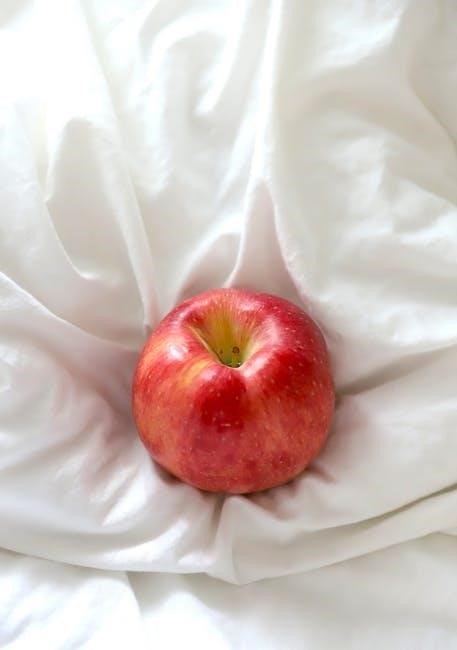The fruitarian diet focuses on consuming raw fruits‚ nuts‚ and seeds‚ emphasizing natural‚ whole foods. It promotes improved health and sustainability but requires careful planning to ensure nutritional balance.
What is a Fruitarian Diet?
A fruitarian diet is a dietary plan primarily consisting of raw fruits‚ nuts‚ and seeds‚ with minimal processing. It is a subset of veganism‚ emphasizing whole‚ naturally available foods. Proponents argue that humans are naturally frugivorous‚ making this diet align with our biological design. Typically‚ 75-80% of the diet is fruit‚ while the remaining 20-25% includes nuts‚ seeds‚ and other plant-based foods. The diet is low in fat and protein but high in carbohydrates‚ focusing on fresh‚ uncooked ingredients. While it can be nutritious‚ it requires careful planning to avoid malnutrition‚ especially for children and teens‚ who need a broader range of nutrients for growth and development.
Benefits of a Fruitarian Lifestyle

A fruitarian lifestyle offers numerous health and environmental benefits. By focusing on raw‚ whole foods‚ individuals often experience improved digestion‚ increased energy levels‚ and enhanced mental clarity. The diet is rich in vitamins‚ minerals‚ and antioxidants‚ which can support immune function and overall well-being. It also promotes natural weight management due to its low-fat‚ high-carbohydrate composition. Additionally‚ a fruitarian diet aligns with ethical and environmental values by minimizing processed foods and reducing carbon footprint. Many adherents report feeling more connected to nature and experiencing improved physical and emotional health. However‚ proper planning is essential to ensure adequate nutrition and avoid deficiencies‚ making it a rewarding yet challenging lifestyle choice for those committed to its principles.

Understanding the Fruitarian Diet Plan
The fruitarian diet emphasizes raw‚ whole foods like fruits‚ nuts‚ and seeds‚ focusing on natural nutrition and sustainability. It requires careful planning to maintain balance and health.
Key Components of the Diet
The fruitarian diet primarily consists of raw‚ whole fruits‚ making up 75-80% of daily intake‚ with the remainder including nuts‚ seeds‚ and other plant-based foods. Emphasis is placed on raw foods‚ avoiding cooked or processed items. The diet is low in fat and protein but high in carbohydrates‚ requiring careful planning to meet nutritional needs. Fruits provide essential vitamins‚ minerals‚ and antioxidants‚ while nuts and seeds offer healthy fats and proteins. Hydration is crucial‚ with recommendations to drink plenty of water or herbal teas. Meal preparation is encouraged to ensure variety and satisfaction‚ avoiding the temptation to eat whole fruits on the go. This approach focuses on natural‚ unaltered foods to promote overall health and well-being.
How to Transition to a Fruitarian Diet
Transitioning to a fruitarian diet involves gradually increasing fruit consumption while reducing other foods. Start by incorporating more raw fruits into meals and snacks‚ ensuring variety for nutrient balance. Gradually phase out cooked and processed foods‚ focusing on whole‚ natural options. Hydration is key‚ so drink plenty of water and herbal teas. Meal preparation is essential to avoid eating on the go‚ allowing time to enjoy and digest food properly. Consider starting with a 3-day fruit feast to reset habits and embrace the lifestyle. Consulting a nutritionist can help tailor the transition to individual needs‚ ensuring a smooth and sustainable shift toward a fruitarian diet.

Meal Planning and Recipes

The fruitarian diet emphasizes raw fruits‚ nuts‚ and seeds‚ offering a variety of recipes that balance nutrition and flavor‚ from mono-meals to creative dishes.
Breakfast Ideas
Start your day with vibrant‚ nutrient-rich fruit-based breakfasts. Enjoy fresh tropical fruits like mangoes‚ bananas‚ or papayas. Blend berries‚ kiwis‚ and pineapples into refreshing smoothies. For a hearty option‚ try fruit salads with apples‚ grapes‚ and pears‚ topped with nuts or seeds. Chia puddings made with coconut water and mixed fruits offer a nutritious and filling start. Mono-meals‚ like a bowl of ripe bananas or a melon‚ provide sustained energy. Incorporate creativity with fruit-based granolas or layered parfaits. Stay hydrated with herbal teas or coconut water alongside your breakfast. These ideas ensure a delicious and balanced morning‚ aligning with the fruitarian lifestyle’s focus on raw‚ whole foods.

Lunch and Dinner Suggestions

Lunch and dinner on a fruitarian diet can be both satisfying and nutritious. Consider vibrant fruit salads with seasonal produce‚ such as tropical blends of mangoes‚ pineapples‚ and kiwis. Hearty fruit bowls‚ topped with nuts‚ seeds‚ or shredded coconut‚ provide texture and variety. For a more substantial meal‚ try layered fruit compositions like stone fruit skewers or melon boats filled with berries. Incorporate greens like kale or spinach into fruit-based salads for added nutrients. Smoothie bowls made with blended fruits and topped with granola or seeds are another delicious option. Don’t forget to stay hydrated with herbal teas or coconut water alongside your meals. These creative ideas ensure a balanced and flavorful fruitarian lifestyle‚ keeping meals exciting and diverse.
Snack Options
Fruitarian snacks are both nutritious and easy to prepare. Fresh seasonal fruits like apples‚ bananas‚ or berries make perfect on-the-go options. Combine fruits with nuts or seeds for added variety and texture. Trail mixes with dried fruits‚ almonds‚ and sunflower seeds are convenient and satisfying. Chia pudding‚ made with soaked chia seeds and topped with fruit‚ offers a nutrient-rich snack. Smoothies blended with a variety of fruits and a splash of coconut water are refreshing and filling. For a sweet treat‚ try fruit-based desserts like raw fruit pies or energy balls made from dates and nuts. These snacks keep you energized while aligning with the fruitarian lifestyle‚ ensuring you stay satisfied between meals.
Considerations and Precautions
A fruitarian diet requires careful planning to avoid malnourishment. It is low in fat and protein‚ making it unsuitable for young children. Consulting a nutritionist is essential to ensure the diet meets all nutritional needs and is tailored to individual requirements.

Risks and Nutritional Concerns
The fruitarian diet‚ while rich in vitamins and antioxidants‚ poses significant nutritional risks. It is often low in essential nutrients like protein‚ healthy fats‚ and certain minerals. Without careful planning‚ deficiencies in iron‚ calcium‚ and B12 are common. Additionally‚ the high sugar content from fruits can lead to blood sugar imbalances; Children and adolescents are particularly vulnerable‚ as they require a broader range of nutrients for growth. The restrictive nature of the diet increases the risk of malnourishment‚ making it crucial to seek professional guidance. A well-rounded approach‚ including supplements and fortified foods‚ may be necessary to mitigate these risks and ensure long-term health.
Consulting a Nutritionist
Consulting a nutritionist is crucial when adopting a fruitarian diet to ensure it meets your nutritional needs. They can help create a balanced meal plan‚ identify potential deficiencies‚ and recommend supplements if necessary. A nutritionist will assess your health goals‚ lifestyle‚ and dietary preferences to tailor advice‚ ensuring you get enough protein‚ healthy fats‚ and essential minerals. Regular check-ins can monitor your progress and adjust the plan as needed. This expertise is especially important for vulnerable groups like children or those with chronic conditions. By working with a nutritionist‚ you can enjoy the benefits of a fruitarian lifestyle while maintaining overall health and well-being.

